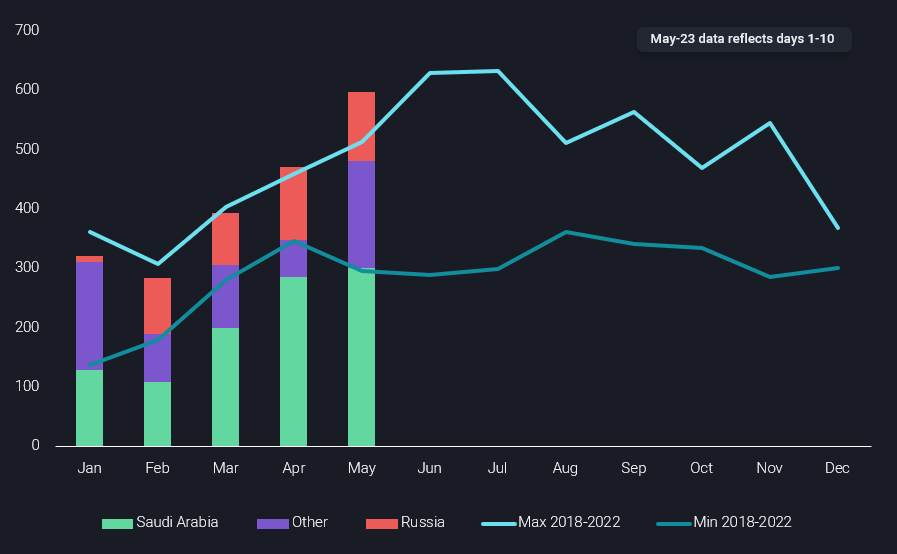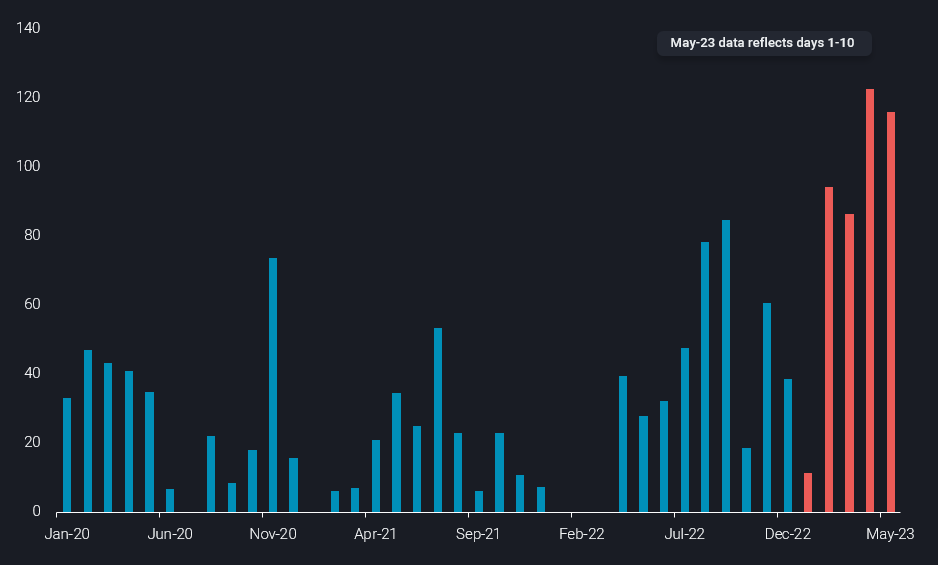Saudi residual fuel oil arrivals boosted by Russian cargoes
Saudi Arabia’s residual fuel oil arrivals are on track for multi-year highs as the combination of a seasonal rise in domestic flows and record imports from Russia lead to increased supplies.
Fuel oil consumption in the Middle East typically picks up as temperatures rise in the summer months, driving the power generation demand. Within the region, Saudi Arabia is the largest swing buyer and to meet its incremental demand, the nation imports typically high sulphur fuel oil (HSFO). However this year, even well in advance of peak summer demand, Saudi Arabia has been importing from Russia at record levels.
For Russia, Saudi Arabia represents a relatively close and significantly large buyer of residual fuel oil. Without Saudi Arabia as an outlet and given the lack of interest from Europe/US, Russian fuel oil would likely have to travel even further eastwards to find a buyer, resulting in higher freight costs and even more reliance upon a tanker fleet that prioritises utilisation for Russian crude exports.
This year we see record highs for Russian fuel oil into Saudi Arabia, lifting total Saudi arrivals to almost 600kbd in May – the very top end of seasonal ranges typically reached only in June-July (see chart below). Saudi Arabia does meet a significant amount of its fuel oil needs from loadings out of its domestic refineries, but since April volumes from international suppliers have grown.


Saudi Arabia residual fuel oil arrivals by origin in 2023 vs total maximum/minimum monthly arrivals during 2018-2022 (kbd)
Historical flow data shows just how much of a change there has been with Russia to Saudi Arabia fuel oil flows, and how quickly import levels have increased this year (see chart below). For April-May, import levels have averaged around 120kbd which is around 50% higher than the peak monthly import level in 2022 and around double the pre-war seasonal peaks in imports of around 50-60kbd.
Interestingly most of the Russian supply arriving into Saudi Arabia this year has come from the Baltic rather than the Black Sea, underlying the lack of Western interest as a critical factor.
Given the scrutiny on Russian shipments in the current sanctions environment, an important question to ask is whether or not Russian fuel oil imported by Saudi Arabia is actually for consumption or if it could be redistributed.
A breakdown by destination for these Russian-origin cargoes strongly suggests the former rather than the latter. All of the 2023 Saudi imports from Russia have headed to Saudi ports which are home to thermal power plants and/or water desalination plants. The argument for the lack of re-export of Russian fuel oil from Saudi Arabia is also made stronger because Saudi residual fuel oil exports have actually fallen in recent months during this year. Preliminary May exports (days 1-10) are currently fractionally lower than the multiyear low set in April of around 70kbd.
Looking ahead, the recent ramp-up in Saudi fuel oil arrivals – including those from Russia – could indicate forward buying ahead of a tighter regional residual fuel oil (especially HSFO) market in the coming weeks. Russian refinery maintenance in the second quarter is reportedly (Argus Media) heavier than the previous year and could crimp exports, as is already expected to be the case with Russian diesel. Meanwhile, the announcement of voluntary production cuts by some OPEC+ nations, should it materialise, would also have a disproportionate impact on reducing medium-heavy crude supplies and therefore residual fuel oil yields.
